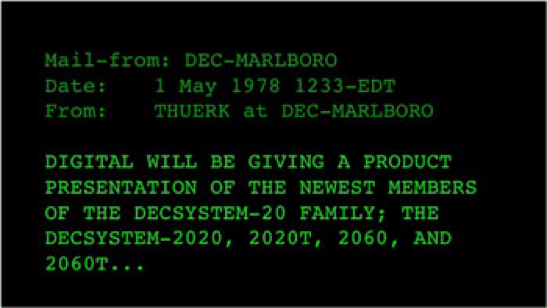In 1978, Gary Thurek, marketing manager at Digital Equipment Corporation, sent the first-ever mass email to around 400 ARPANET users. Take a look.
This text-based, prosaic, generic email yielded a wallet-popping $13 million in sales, notwithstanding the fact that the recipients had not voluntarily chosen to receive such a message. The marketer had the upper hand, and his product(s) was unquestionably beneficial, if not necessarily relevant, to the potential customer.
Cut to now, and any such generic email blast is rightly viewed as intrusive, no matter how potentially beneficial to the recipient. If it is not also relevant to them, it is spammy.
Marketing is no longer a top-down game in which marketers talk at, instead of to, their customers. Marketing today is first and foremost an equal relationship. Any such relationship requires looking after. Hence the need for customer relationship management, aka CRM.
To really nail it home with a couple of stats: 47% of companies improved their customer retention rate after they began to use CRM. What’s more, companies that use CRM witness a 300% hike in conversion rates.
In this post, we focus only on CRM for email marketing. More specifically, we look at the five most fundamental features any CRM software must have.
1. Bulk Send-ability
Your chief goal is to deliver personalized experiences. To achieve that, you must design your emails keeping an eye on the segments you have created.
No two segments are the same, yet each segment has contacts who share the same traits according to which you create a single email, and send it in bulk, albeit at a much smaller scale, compared to mass email blasts.
Normally, almost any competent CRM software has the bulk send feature. In Klaviyo, for instance, you can send a single email campaign to 15 segments/lists at once.
2. Engagement Trackability
For campaigns to have a better chance at succeeding, you need to know how subscribers engage with your emails, and adjust strategies accordingly. Email tracking is therefore critical for dynamic, results-driven CRM email marketing.
Typically, emails are tracked through read receipts, pixel notifications, and trackable links. Read receipts are old-school means of tracking whether or not an email has been opened. This way of tracking emails is neither reliable nor ESP-friendly.
Most CRM software today use Web Beacon Trafficking, whereby tiny tracking pixels, loaded from a tracking server, are recalled from the recipient’s server upon an email being opened, which then is counted as one ‘open’.
It’s a fairly reliable form of tracking, but it may report false positives in the case of ESPs that do not always load images when an email is opened. And what is CRM email marketing, if not accurate, pertaining especially to important metrics.
Coming to tracking links, the CRM platform adds a tracking code to a link on your website, which tracks user activity for that particular link only. Data on each link is unique to that link. Link tracking is one of the most reliable ways to track engagement.
Mailchimp, for example, uses both pixels and trackable links to monitor subscriber engagement.
3. Email Automation Feature
87% of B2C companies use automation in their email marketing campaigns. What’s more, businesses that leverage marketing automation software have witnessed a 451% increase in qualified leads.
Sending the right content to the right segment at the right time is only possible through automation. It’s no longer just an alternative, but the cornerstone of successful CRM marketing campaigns.
CRM automation also saves time in a number of ways. For example, if a viewer has filled out a form on one of your landing pages, or has subscribed to your weekly newsletter, they are automatically added to your CRM.
You can also set up automated welcome campaigns to engage new customers right away. CRM automation can easily segment a large contact list according to subscribers’ individual preferences, helping you to send highly targeted emails.
Make sure your CRM has default integrations with other tools for easier automation. HubSpot, for instance, is a popular CRM for email marketing that can be integrated with over 600 sales apps, including Gmail, Calendly, Slack, Facebook Messenger, Zoom, WhatsApp Business, etc.
4. Custom Templates Feature
Email templates are almost universally available on CRM platforms. However, many CRM providers have built-in templates for very specific kinds of emails, such as welcome emails, cart abandonment emails, newsletter emails, reengagement emails, etc.
We recommend you look for a CRM software that allows you to design custom email templates as well. With the help of custom email templates, you can tailor your message to your unique business needs. You are free to incorporate into your emails the distinct ethos of your brand.
CRMs that have custom email templates also allow you to A/B-test your emails to determine which type of email works best for subscribers in every segment.
Many platforms that offer CRM for email marketing include custom email templates in their functionality. In Salesforce, for instance, you can create different types of rich, visually engaging email templates, either on Salesforce Classic, or on the Email Template Builder in Lightning Experience.
5. Smart Alerts Feature
Smart alerts, or real-time notifications, are one of the most useful features in an automated system. Whenever a user interacts with your brand you receive an alert, which directs your attention to the event, giving you the opportunity to follow up immediately, and in a more personalized manner.
Most CRMs have built-in smart alerts, and some platforms also offer customized alerts. We recommend you look for the latter kind for a more foolproof CRM campaign management.
Pardot, for example, enables you to track link clicks on your website, app, or third-party websites. Pardot Page Actions notifies you when a prospect visits your website. Pardot’s form handler sends an alert whenever a prospect fills out a form on your website.
You can also set up automated alerts for daily/monthly prospect activity. Equally, you can be notified when a starred prospect assigned to a Pardot user is active, and so on.
Wrapping Up!
Apart from keeping tabs on the availability of the above five features while choosing a CRM with email marketing, you should also:
- Consider your business objectives: what exactly do you want a CRM software for?
- Determine the type of CRM software: you might need a specialized solution, depending on your niche. For instance, if you’re in the healthcare sector, look for a software that complies with the Health Insurance Portability and Accountability Act (HIPAA).
- Compare vendors: Create a shortlist of your preferred platforms, and compare them. Look into third-party reviews as well to make an informed decision.





Susmit Panda
Latest posts by Susmit Panda (see all)
UTM Tagging in Email Marketing Campaigns- Exploring its Whys and Hows!
SMS Marketing 101: How to Integrate Kalviyo with Your Strategy